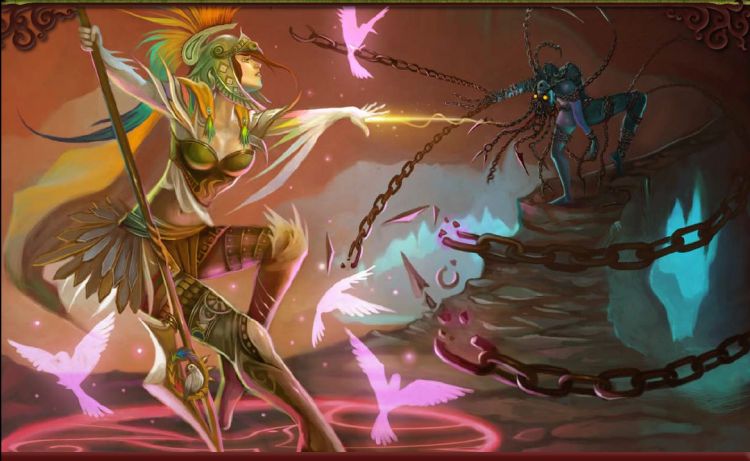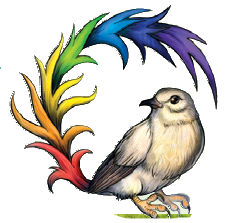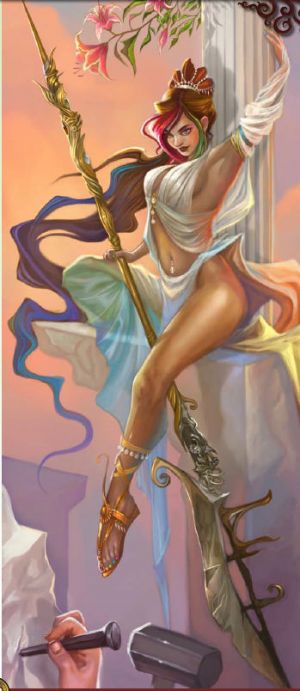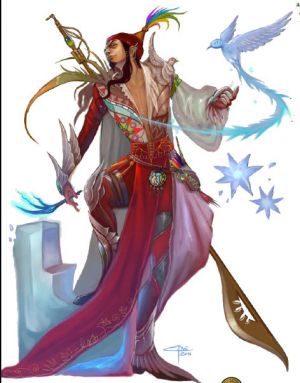Shélyn

- “Fill your heart, eyes, and mind with the beauty of the world. Without beauty and love, we are nothing.”
- —Melodies of Inner Beauty
Présentation[1]
Shelyn (SHEHL-ihn) is a goddess with a kind heart, who would move mountains or take extreme risks for those she loves. As a very old goddess who has watched monstrous civilizations reshape the world while primitive humans had yet to discover fire, she has seen countless variations in art, and innumerable love stories played out under extraordinary and impossible circumstances. She is a passionate and creative artist in both matters of the heart and works of beauty. She tries to always make the world a better place by her actions. She preaches and practices that true beauty comes from within, and that every person can be beautiful in some way or aspect. She has soothed enough broken hearts to know that love and beauty are not easy things, but she remains an optimist, for she has seen these things mend hurts and turn others away from evil.
Shelyn represents all aspects of love, whether innocent affection between children, courtly love between a knight and a lady, companionship from a beloved pet, the devotion of a parent to a child, the steady tenderness of an old couple, the chaste adoration of a paladin for a deity, or the passionate vigor of newlyweds. However, she prefers relationships not solely based on carnal desires; she does not oppose such relationships, but hopes they blossom into something more meaningful. Likewise, she does not consider greed true love, whether the coveting of riches or jealous feelings toward an uninterested person.

Shelyn is always shown as a young woman barely out ofher youth, with eyes of blue or silver (or sometimes one eye of each color).
Her hair is ankle-length, with several strands ofbright green, red, and gold. She is usually shown as a human, though her ethnicity and coloration may vary, and she has been depicted as an el£ half-elf, dwarf^ gnome, halfling, and even a half-orc. She always wears tasteful clothing and jewelry that accentuate her beauty without revealing too much of it. Her physical proportions vary depending on the artist and regional standards for beauty—in some lands she is shown as thick bottomed and pot-bellied, while in others she is shown as strong and sturdily built, or waif-thin in still others, depending on the look favored for young women in that region. The goddess herself prefers appearing as a human woman of average proportions and exceptional beauty, dressed in attractive but comfortable clothing. Her avatar is the embodiment of passion, energy, and devotion, and nearby objects and even the air and light themselves bend toward her as if her very proximity brought bliss.
Shelyn is the daughter of an unknown mother and the spirit-wolf Thron, the Prince That Howls. Thron once roamed the mountains, forests, and skies, singing his feral song to the earth, stars, and moon, proclaiming his love for life and song and love itself. He had many mates among the spirits and mortals, and from these unions came two children greater than he: his daughter Shelyn and his son Dou-Bral. Shelyn is unusual in that she and her brother are the only close relatives among the major Golarion deities. (Several nonhuman deities have divine families, particularly the dwarven pantheon, but none of them are as prominent as these two.) Ages ago, Shelyn and Dou-Bral quarreled, and he left the world to explore regions past the edge of the Great Beyond, abandoning his divine interests and responsibilities. When he returned, possessed by an alien mind and transformed into the dark god Zon-Kuthon, he captured and tortured his own father,
remaking the noble wolf's flesh into his herald, a thing of pain and horror. Zon-Kuthon and Shelyn fought again, but eventually the goddess wrested his glaive from him (thinking it was the source of his corruption), and the two declared a truce. Despite the hurts he has caused, she has not forgotten the person he used to be, and hopes to someday redeem him. Her story oflove and devotion despite sorrow inspires mortal friends and lovers to persevere in adverse circumstances, bards to craft epic songs and tragedies, and artists to create works that touch the soul.

Shelyn’s domain is a remote valley on Nirvana, where she, her petitioners, her servants, and allied agathions celebrate the creation of beauty and respect for love. Nearby is a similar valley, empty of creatures, said to have been the original realm ofher brother before he became Zon-Kuthon. Especially blessed artists may receive visions ofher realm’s landscapes to inspire their works, and many widows and widowers ofher faith experience dreams of walks in the realm's rose gardens, with their deceased loves at their side.
Shelyn sometimes contacts her faithful directly by means of short but precise whispered messages in the ear, but she prefers to work through reassuring thoughts and reminders ofloved ones or favored music. Songbirds are sacred to her church; their presence is considered good luck, and most temples include feeders on the roof or in nearby trees to encourage bird visitation and nesting. Shelyn’s displeasure can manifest in a number of ways, such as a brief glimpse of a repellent reflection in a mirror, a lover’s quarrel, a drably colored bird, a bird singing off-key, or wilted rose beds. She is slow to anger, and even the harshest communication from her is not harmful, only temporarily uncomfortable. She is greatly saddened by those who betray the ones they love, and haunts such folk with guilt and the subtle sounds of those they betrayed until they either genuinely ask for forgiveness or abandon the faith entirely.
Shelyn is neutral good, and her portfolio is beauty, art, love, and music. Her weapon is the glaive Whisperer of Souls, seized from her brother Zon-Kuthon and claimed as her own; she keeps it as a reminder of her brother’s transformation and to show her worshipers that it is necessary to fight for the things you love. Her holy symbol is a songbird with rainbow feathers. Her domains are Air, Charm, Good, Love, and Protection.
Shelyn is worshiped by people of all alignments and social statuses. Good and neutral folk seek her counsel in finding love or inspiration for music and art, or regaining a straying love or lost muse. Evil folk turn to her when they realize their lives are empty without love and beauty, or pray to her hoping to turn the heart of a cherished prisoner (in the end finding their own hearts awakened instead). Many scoff at her faith as being full ofweaklings, dandies, dreamers, and fools—but in the presence of her power, they cannot help but love her, for all things love her, even unfeeling undead and unthinking objects.
The truth is, many of Shelyn’s faithful are dreamers and fools—drunk on love, they believe that love is sword, shield, food, and drink. Most of her long-term followers are more practical, however, knowing that while love is intangible, a journey, and a source of inspiration, it must be tempered with common sense. Only a lucky few can afford to abandon everything for the sake of love; most must find love as they can, relish it when they find it, and remember it fondly if it leaves. In the middle are folk who wear their hearts on their sleeves—quick to fall in love, obvious in showing it, obvious again in mourning when the heart is broken, and willing to risk breaking it again. A devoted follower of the goddess’s love aspect truly feels alive only when in love or in pursuit oflove.
Devotees of art are the more practical members of the faith, though only relative to the lovestruck. Artists starving to perfect their craft, whether it be the musician who forsakes all others in pursuit of the perfect song or the dancer who practices for hours on blistered feet to perfect a single movement, are all devotees of Shelyn, obeying the obsessive urge to create something that will inspire others for generations. The goddess doesn’t ask mortals to attempt this level of devotion, but she understands and respects the heartfelt desire to create, whether out oflove, grief, the desire for fame, or the edge of madness.
Among her worshipers are artists, young lovers, old couples still very much in love, musicians, those awaiting arranged marriages, the broken-hearted, and romantics of all stripes. Star-crossed lovers pray to be united, and young men and women pray to catch the eye of a crush or to find attractive and loving spouses. A husband in a politically motivated marriage prays that his wife never meets his beloved mistress, while his wife asks that her husband never suspects the peasant boy who makes her heart ache with longing. Shelyn does not require fidelity, but teaches that you should not be reckless with other peoples’ hearts, nor should you tolerate those who are reckless with your heart, for an oft-broken heart is slow to heal.
Marriage for love pleases her, as does finding love outside a marriage when doing so does not hurt the spouse. Parental love is powerful and usually the first love any creature knows, and therefore she supports having children (whether by birth or adoption), no matter the organization of the family unit, as long as they are raised by loving parents. Though she considers divorce a sad thing, she understands that hearts may change, and it’s sometimes better to end a marriage than to fight too hard to save something doomed to fail.
Worship services for Shelyn may be quiet and slow-paced or loud and upbeat, but they are always heartfelt; dance and music are central to any ritual. Food, particularly large group meals where every person or family brings a different pot or plate offood, is common at evening ceremonies, and is often used to welcome new members ofthe community.
Temples and Shrines[1]
Shelyn’s temples are roomy places surrounded by gardens and statues, decorated inside with paintings and sculptures and always filled with music. Most have at least one rosebush in the garden. The walls are decorated with framed calligraphy of poems from her holy book (these works are sometimes sold to wealthy patrons, who present them to their loved ones). The temples are havens for young lovers, with romantic views of statues, natural scenes, or the sky, and are the sites of many wedding ceremonies. Often the temple art was donated, created, or sponsored by those who found love and approval from the church when all others opposed them; priests ofthe temple usually create the rest.
Individual Shelynite temples may focus on one type of art, such as painting or dancing or a type of musical instrument, particularly if the temple is small. Larger ones are often multidisciplinary, with a leaning toward orchestral performance or theater, particularly in Taldor.
Many temples are associated with one or more agathions, similar to patron saints. These agathions are believed to have once been mortal worshipers ofShelyn whose reward for their devotion to beauty and love was transformation into celestials. These temples usually have iconography and art relating to their agathions and the noble animals they resemble.
The church as a whole is disorganized, but this doesn’t really hinder its activities. Priests gain status based on wisdom (particularly in overcoming problems with loved ones) and artistic sense, but otherwise a temple usually makes decisions communally. Those priests who agree with a particular solution help work toward it; those who disagree either try a different method or stay out ofthe situation.
Formal garb for the church is a pair ofleggings and a long tunic for men or a calf-length dress for women. The clothing is cut and tailored to flatter the wearer but is not overtly sexual. Bright green, red, and gold are preferred colors. White overgarments such as vests, belts, or scarves are used to accent the main colors. Many ceremonial outfits include the image of a rose in one of these four colors, and rose-adorned regalia are part ofmany religious ceremonies.
a priest’s role[1]

Most of Shelyn’s clergy are clerics or bards, though she has a few paladins, druids, and rangers of high status in her church. Their duty is to promote and protect beauty, art, and love so that these things may flourish, and to inspire others to joy and enlightenment. Though all priests have access to charm magic, they do not use it recklessly or to seduce, as doing so is a violation of the goddess’s teachings and unfair to those who might be honestly searching for love. Her clergy have, however, been known to use magic such as calm emotions to ease the hurt of a broken heart. Most priests eventually get married, though some refuse to limit themselves to just one partner, and practice respectful polyamory or polygamy.
A priest must endeavor each day to create something of beauty. Typically this is visual art or music, but other skills such as gardening, mentoring others in music or other arts, or aiding a local theater count for this purpose. Among more militant priests, beauty may come from the perfection of acrobatic and aesthetically appealing martial arts and weapons routines. The priesthood recognizes that mortals can be superficial, rejecting good folk unlucky enough to be unattractive, and so priests help these ugly ducklings to find their inner beauty while simultaneously finding ways to accentuate their more attractive physical qualities, often through the use of flattering clothing or hairstyles. Those with no talent for creating art often work in jobs where they can associate with, sponsor, and look after artists. Some serve nobles as scouts for upcoming talents or arrange patronages between these individuals. Wealthier priests may own theaters, art galleries, concert halls, or music schools.
Typically, non-adventuring priests support themselves through some kind of art, which means they tend to be employed in larger cities or travel in the manner ofwandering minstrels. Shelyn’s rangers and druids are usually the sort who live offthe land, content to watch over places ofnatural beauty or perhaps hire themselves out to lovers in need of a fresh start in a new place. In general, her priests make fine negotiators and teachers, as the people they interact with can’t help but like them and want to please them.
Though few layfolk worship her exclusively, Shelyn is a favorite ofanyone seeking love, joy, or beauty—commoners pray their newborns will grow up handsome or beautiful, nobles pray that arranged marriages brings them kind and attractive mates, cowhands pray to dance with the most attractive shepherds, and so on.
holy text[1]
Shelyn’s holy book is Melodies of Inner Beauty, a collection of stories about the goddess, her family, her history, and her doctrine, each written in a different style. Melodies is more of a hymnal than a prayer book—most stories are expressed through song, others through storytelling or epic verse, and still others are meant to be spoken during a dance. The book glosses over the ugly parts of the stories (particularly about Zon-Kuthon), though other divinely inspired documents of the church reveal more details.
aphorisms[1]
There are innumerable poems and songs inspired by love, yet most followers hold three sayings as Shelyn’s most important messages.
The creation ofbeauty is the highest art. Even the tiniest thing done to make something of beauty or improve a thing’s appearance is a blessing to the world.
Love is never born of evil. Love is a positive, fulfilling energy. Possessiveness, jealousy, and similar feelings stem from evil, and are not love. Rejoicing when your enemies suffer is evil; though their punishment may be deserved, a loving heart does not allow itselfto be discolored by hatred. Love is the greatest of all things. Knowledge, language, and prophecy all pass in time, but love, faith, and charity toward others persist, their repercussions felt in this world and the next. Even when love is barely more than a flickering candle, it can ignite the heart and soul into a raging flame that defies time, death, war, fate, and nature.
holidays[1]
The church of the Eternal Rose has no universal holidays except Crystalhue. However, any anniversary of love is reason for an entire temple to celebrate, and vow-renewals are a common occurrence among the faithful. For a temple associated with an agathion, that celestial’s mortal birthday, wedding anniversary, or confirmation in the church may be a local holiday. Crystalhue (Winter Solstice): This day of artistic creation is traditionally a time for courtship and romantic proposals. Originally a secular event created by bards in Taldor, its popularity grew over several decades until members of the church adopted it as their own about 200 years before the Age of Lost Omens. The faithful celebrate it by exchanging small tokens of polished crystal, typically on rings or pendants. Some temples support the poor by providing the materials to create these simple items, and by setting up areas outside temples where the items are then sold in the days before Crystalhue.
relations with other religions[1]
Shelyn is in a unique position among the deities in that everyone loves her and wishes to please her (though they may not acknowledge this when she is not around). She cannot help this, as it is merely her nature. However, the other gods and goddesses all have different ideas about what it is to love someone, and far too many of the evil ones equate love with ownership (and treat their “property” horribly). Asmodeus would make her the greatest of the Whore Queens. Lamashtu would make her the mother of the most “beautiful” monsters. Rovagug would place her within one of his eyes so that she might watch the glory ofhim destroying all creation. These evil beings consider this “love” the highest honor, but obviously the Eternal Rose rejects these things. She has been romantically involved with several minor and major deities, but refuses to bind herself to any of them for fear of hurting all others who love her. She has no children, though few believe her to be absolutely chaste in her interactions with other divine beings.
Shelyn is friendly with Bolka, the dwarven goddess oflove and beauty, though recognizing that their worshipers have very different ideas about such things. There is also some overlap between Shelyn’s interests and those of Calistria, goddess oflust. Fortunately, the two amuse each other and understand the need for both lust and love in a passionate relationship, and likewise that a loving relationship can turn lustful and vice versa (though neither deity truly respects the other’s interests). Neither goddess has any serious designs on the other’s followers, and while Calistria covets Shelyn, the Eternal Rose rejects these advances because she knows the interest is superficial and carnal.
Shelyn is the only deity who has any regular contact with Zon-Kuthon. The two half-siblings have reached an agreement about their disagreement, and he never attacks her. However, she remains wary that the evil force that controls him might one day change its mind, and so is more cautious with him than with any other being in the universe. She also recognizes the look of longing in his eyes when he sees her glaive, and suspects that somehow its alien thoughts are the key to freeing her brother from the dark shadow that consumes him.
The one other constant sorrow for Shelyn is her broken relationship with Nadiri, a minor goddess of suicide (particularly romantic suicide). Originally Nadiri was just a divine servant of Shelyn, tasked with watching over couples whose love was forbidden by race, culture, or family decree, but when one pair ofher mortal wards chose to kill themselves rather than live apart, she somehow gained supernatural power and fled from Shelyn in fear and confusion, eventually becoming the Lost Maiden, a true (if very minor) deity. The Eternal Rose has tried to reconcile with Nadiri many times in the past 3 centuries, but strange circumstances always manage to keep them apart (and have been the inspiration for several tragic operas, whether directly about the goddesses or rewritten as a story about mortals). Shelyn senses the young goddess slipping away from her. The Lost Maiden has attracted the attention of Urgathoa, Zyphus, and even Hanspur, which puts Shelyn at odds with them and places their otherwise-amiable relationships on shaky footing.
new spells[1]
Clerics and paladins ofShelyn may prepare charm person as a ist-level spell and good hope as a 4th-level spell; they may prepare sympathy as an 8th-level spell but can only cast it on works of art. All priests treat charm animal as if it were a 2nd-level spell on their class spell list. Bards may learn eagle’s splendor as if it were a ist-level spell. In addition to unbreakable heart (see Pathfinder Campaign Setting: Gods and Magic), her priests have access to the following spell.
Aspect of the Nightingale
School transmutation (polymorph); Level bard 1, cleric 1,
druid 1, paladin 1, ranger 1 (Shelyn)
Casting Time 1 standard action Components V, S, DF Range personal Target you
Duration 1 minute/level
You take on an aspect of a nightingale. Your voice becomes clear and pleasant. You gain a +2 competence bonus on Perform (sing) checks and a +2 competence bonus on Diplomacy checks. Once per minute, if you are subject to a charm effect that allows a saving throw, you may roll twice and take the more favorable result.
planar allies[1]
Shelyn’s divine servants are either transformed petitioners or supernatural beings she has created. Her herald is the Spirit of Adoration (see page 88), a giant winged woman whose eyes burn with the fire of true love threatened. The following are two of her most blessed minions.
Harmonia: This cloudlike being contains dozens of winking eyes and singing mouths. She remembers everything she hears, and delights in carrying messages, often improvising songs from these missives and whispering them to bards a hundred years later. She prefers to be paid with new music created by skilled performers, though she also accepts fine instruments and scrolls of bard spells.
Phoenix Tail: This brilliantly plumed avoral (Pathfinder RPG Bestiary 2 16) bard is a master calligrapher and painter, using his own feathers as quills for writing and as canvas for paint. He has moments of mania and spells of dark depression, both of them fueling his art and devotion to the goddess. He crafts magic items out of his own plumes (particularly bird and swan boat feather tokens) and gives them to mortals pursuing art, music, or love. He prefers payment in the form of original paintings and fine inks and paints.
Customized Summon List[1]
Shelyn's priests can use summon monster spells to summon the following creatures in addition to the normal creatures listed in the spells.
Summon Monster II Grig* (Bestiary 2)
Summon Monster III Silvanshee agathion (Bestiary 2)
Summon Monster V Vulpinal agathion (Bestiary 2)
- This creature has the extraplanar subtype but is otherwise normal for its kind.